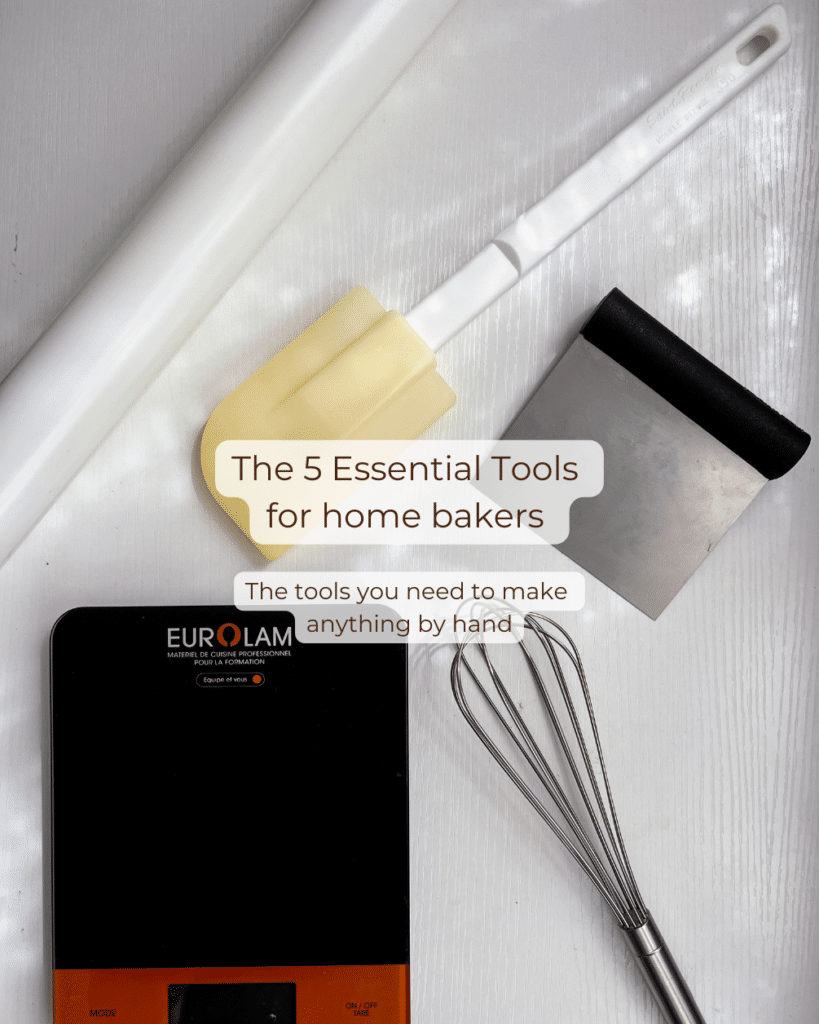This page may contain affiliate links. This means I may get a small commission if you purchase through these links, at no additional cost to you.
As a home baker, you may think you need a stand mixer, hand mixer, or food processor to make fancy and impressive baked goods. That is absolutely not true. I went to French pastry school in Paris, and we learned how to make everything by hand first before moving on to machines. This included meringues, breads, tart doughs, and laminated doughs!
Here are my 5 essential tools that belong in any baker’s toolkit, regardless of skill level. These were the ones I would reach for every single day at pastry school. I’ve kept this list short so it’s not too overwhelming or expensive for those just starting on their baking journey!
Food scale
A digital food scale is essential for bakers and I cannot recommend it enough. Why is it better than using cups? It’s far more precise, so that you can be confident you are putting in the correct amount of each ingredient. This leads to consistent results and is key for troubleshooting.
Qualities to look for in a food scale
- Digital
- Ability to toggle between different weight measures (g/oz/ml are the most important)
- Tare button
- Max weight should be high enough for the quantities you typically bake at
- E.g., if you’re making multiple loaves of sourdough bread that require 1 kilo of flour, the scale should be able to handle that plus the weight of your bowl
- Minimum precise graduations of 1g
Food scales I recommend
I use this food scale at home. It’s not too expensive and gets the job done, and it’s easy to order online.
At pastry school, we use this food scale from Eurolam. It’s a French brand, so I think it’s less accessible for Americans.
Dough / bench scraper
Dough scrapers are underrated and are the most versatile tool. They are also incredibly affordable and give you great value for money. In my opinion, the bench scraper is the best replacement for a stand mixer or food processor when it comes to making doughs. Bench scrapers help you:
- Make crumbly tart and cookie doughs
- Make pie dough
- Make croissant, brioche, sourdough, and other yeasted doughs
- Handle sticky doughs of any sort
- Cut butter and other ingredients
- Scrape and clean your countertop
Qualities to look for in a dough / bench scraper
- Made of stainless steel. The flexible ones won’t be as good for cutting
- Straight edge
- Comfortable handle
- Bonus if there are measurements written along the edge. I find this handy for quick measuring when I can’t be bothered to pull out my ruler
Dough / Bench scrapers I recommend
I use this bench scraper and have had it for many years.
Spatula
Spatulas are your all purpose tool and it’s worth investing in one that is sturdy and high quality. In pastry, spatulas are used for:
- Stirring hot mixes, ganache, etc
- Spreading and smoothing out creams and icings
- Scraping out a bowl
- Folding batters and creams
Ideally you have multiple spatulas to avoid cross contamination. I recommend at least 2, one smaller and one larger.
Qualities to look for in a spatula
- Sturdy, durable head with flexibility
- Head is attached to the handle. The ones where the head detaches are less sturdy and less sanitary
- Heat resistant
- Does not absorb oils and odors
Spatulas I recommend
At school, we use spatulas from Saint Romain, a French brand.
Since French brands are less accessible in the US, I’m also providing a link to this set. It comes with 2 spatulas of different sizes, is heat resistant, and the heads are attached to the handles. I personally have not used it, but the specs and reviews seem reasonable.
Whisk
Whisks help incorporate air and break up lumps and chunks in your mixes. They are key for making whipped creams, meringues, and fluffy sponges. Like spatulas, I recommend at least 2, one smaller and one larger.
Qualities to look for in a whisk
- Made of stainless steel
- Ballon shape
- Head and handle are welded together
Whisks I recommend
At school, we use whisks from Saint Romain, a French brand.
Again for the sake of accessibility, I’m also providing a link to this set comes with 3 whisks of different sizes. I personally have not used it, but the specs and reviews seem reasonable.
Rolling Pin
A good, sturdy rolling pin will be your best friend when it comes to smoothing out doughs, hand lamination, and even chocolate work. A good rolling pin should help you achieve smooth, even roll outs with control over size and thickness of the dough.
Qualities to look for in a rolling pin
- No handles. I find handless rolling pins give you better control over the shape and thickness of your dough
- Made of non-stick plastic or wood. Personally I find marble rolling pins to be heavy and unwieldy and are better to look at than to use.
- No ring thickness guides. Some rolling pins come with guides that theoretically help you achieve even thickness. These are less versatile and lead to marks on your dough. If you want thickness guides, you can buy a set that you can attach to your rolling pin.
- Long enough. A longer rolling pin is more versatile, helping you achieve more even dough, and can be used for larger pieces of dough. I recommend at least 17 inches long.
Rolling pins I recommend
At home I use this wooden rolling pin with tapered ends.
At school, we use a plastic rolling pin. This rolling pin is the most similar one I could find that is easy to order to the United States.

